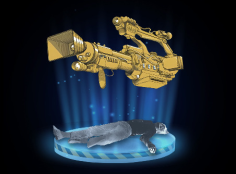
In Contraptions by Jeffrey Weinzweig, the fictional NEXUS operates as a private, secretive corporation dedicated to advancing technology outside the reach of public oversight. This independence allows NEXUS to develop cutting-edge technologies with significant defense applications, drawing attention to the consequences of blending innovation with military-industrial interests. While companies that partner with defense organizations often push the boundaries of what technology can achieve, NEXUS represents a potential dark side to this collaboration. The novel sheds light on the dangers of aligning advanced technology with military goals, often leading to its co-opting for destructive uses rather than for the betterment of society.
The Militarization of Innovation
NEXUS’s research facility, located outside NASA’s headquarters in Houston, operates under tight security, concealing its technological projects from public view. The book describes NEXUS as focusing on “highly secretive research endeavors” that go far beyond civilian applications. This setup mirrors real-world dynamics within the military-industrial complex, where defense interests can override civilian needs and ethical considerations, prioritizing secrecy and control over technological transparency.
The Thermalyzer, a device mentioned in the book developed by the protagonists with the ability to capture images from the past using residual thermal energy, is an example of a technology with vast potential. While Derek and Ojo, the inventors, imagine its use for constructive applications like forensics, NEXUS sees broader and potentially harmful applications. In the hands of an entity like NEXUS, a tool that could be used to solve crimes and uncover historical truths could instead become a method of surveillance, manipulation, and possibly even warfare.
Implications of Defense Alignment
By aligning with defense goals, NEXUS exemplifies the ethical risks of technological advancements being commandeered by military interests. While technological progress is often driven by defense funding, the militarization of innovative devices like the Thermalyzer underscores the risk of repurposing inventions for coercive and destructive purposes.
Moreover, the clandestine nature of NEXUS’s operations raises questions about who benefits from this technology. When inventions like the Thermalyzer fall under the influence of powerful corporations tied to the military-industrial complex, society loses access to potentially transformative tools. Instead of contributing to social advancement or improving quality of life, these technologies are funneled into secretive projects that serve power structures rather than the public.
The Future of Civilian Technology and Public Oversight
The alignment between NEXUS and defense goals in Contraptions serves as a cautionary example of how privatized, defense-aligned entities can redirect technology’s course away from public welfare. By restricting technological advancement to meet the demands of secrecy and military strength, NEXUS represents a scenario in which civilian society is deprived of the potential benefits that could arise from groundbreaking technology.
Weinzweig’s novel ultimately warns of the risks of allowing military-industrial interests to dictate technological progress. When technologies like the Thermalyzer are co-opted by corporations aligned with military goals, society loses out on innovations that could drive progress, ensure transparency, and promote social well-being. Contraptions serves as a stark reminder of the need for balance between innovation for security and innovation for public good, emphasizing the importance of ethical governance and public oversight in technological development.
